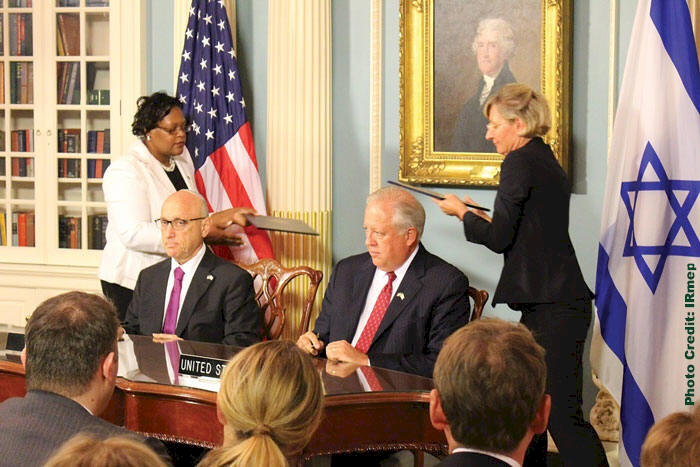10-year Memorandums of Understanding
US aid to Israel
- Fiscal Years 2009-2018 and 2019-2028
Documents
 The United States has
given Israel more foreign
assistance than any other country. In recent decades, a guaranteed
aid minimum has been formalized through ten-year "memorandum of
understanding" agreements signed by the US Department of State and the government of Israel. The United States has
given Israel more foreign
assistance than any other country. In recent decades, a guaranteed
aid minimum has been formalized through ten-year "memorandum of
understanding" agreements signed by the US Department of State and the government of Israel.
In the world of business, MOUs are not legally binding and
are
frequently just stepping stones to binding legal contracts for
initiatives such as joint ventures or partnerships. In US law, MOUs
are the same as non-binding "letters of intent."
MOUs are used in international relations because they take less time to
enact, do not involve ratification by the US Congress and can even be
kept secret from taxpayers.
In September of 2016, three days after
ratification, IRmep requested the 2019 ten-year MOU from the US
State Department under FOIA. While mainstream news outlets based their
reporting on an official
White House
web page, IRmep discovered many troubling aspects about the
commitments the U.S. had pledged in the actual document. First, the
MOU seemed to
incentivize war by guaranteeing
additional aid in the event of military
conflict. Second, although the Obama administration trumpeted that
more of the aid package would be spent in the United States (ostensibly
producing jobs,
though military industries do far less of that than other sectors), the MOU permits up
to 28% to be spent inside Israel (more than the 26.3% in the previous
2009-2018 MOU.)
IRmep also sought the Fiscal Year 2009-2018 MOU
negotiated with Israel during the Bush administration. Unlike treaties
for
mutual military defense, the MOU
unilaterally promised a minimum of $30 billion
over ten years assuming "adequate funding levels for U.S. foreign
assistance overall."
Although the
Symington and Glenn provisions of the
Arms Export Control Act prohibit, subject to certain provisions, foreign
aid to nuclear states that are not signatories to the Nuclear
Non-Proliferation Treaty, neither Congress nor the President have chosen
to recognize Israel's status as the only nuclear power in the Middle East
in aid legislation or when signing spending authorizations into law.
|
